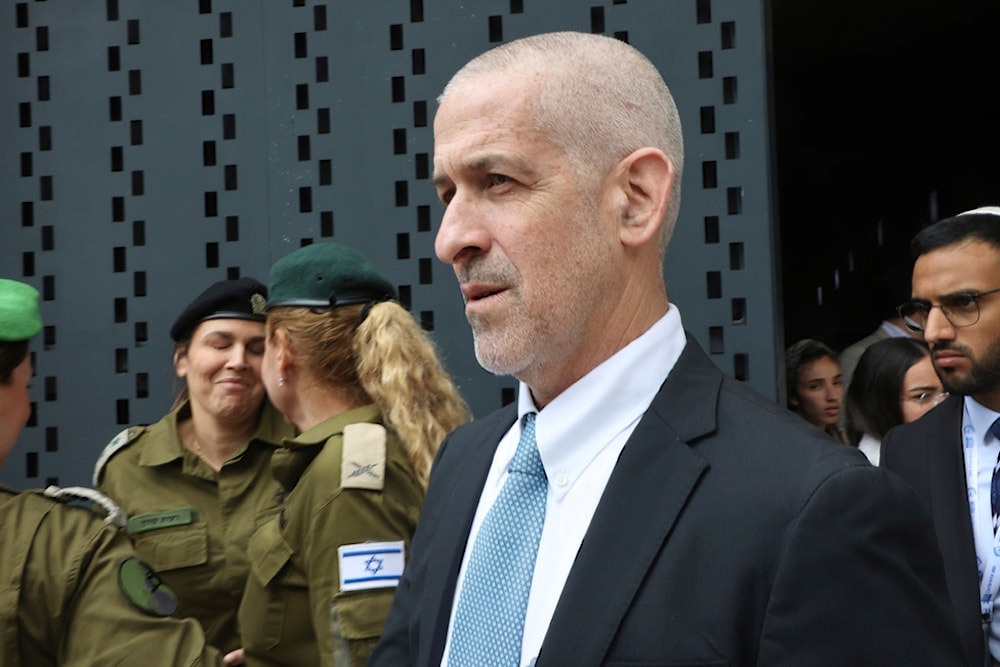Netanyahu announces decision to fire Shin Bet Chief, latter refuses
The Attorney General's Office has intervened, issuing a letter to Netanyahu outlining the legal procedures required before Shin Bet chief Ronen Bar can be dismissed.
-

Ronen Bar, chief of "Israel's" Shin Bet security agency, attends a ceremony in occupied Palestine, May 13, 2024 (Pool photo via AP, File)
Israeli website Ynet reported on Sunday that Prime Minister Benjamin Netanyahu has decided to dismiss Shin Bet chief Ronen Bar, summoning him to inform him of the decision.
The Prime Minister's Office stated that the matter will be put to a vote in the cabinet meeting this week, effectively bringing Bar's tenure at the Internal Security Service to an end. Sources within the Prime Minister's Office indicated that Netanyahu had urged Bar to step down voluntarily, but after he refused, the prime minister opted for dismissal.
Bar, who previously acknowledged the shortcomings of Shin Bet in the lead-up to the October 7 operation, had expressed his intention to remain in office at least until May. He has been advocating for an independent commission of inquiry to investigate the failures of the leadership, the Israeli Occupation Force (IOF), and security agencies—a move Netanyahu has strongly opposed.
In a recorded statement, Netanyahu said that over time, he had "increasingly lost confidence" in Bar, stressing that maintaining trust in the head of the security service is crucial during wartime. However, the decision to remove Bar may be challenged in court due to concerns over a potential conflict of interest.
Axios reporter Barak Ravid said that according to Netanyahu's aides, he decided to move forward with the firing of the head of Shin Bet after the PM's visit to Washington in early February.
Ravid quoted these aides as saying that "he was inspired by the moves Trump took 'against the deep state' and his decision to appoint loyalists to all key posts."
In a statement, Ronen Bar said he'd told Netanyahu he had "several sensitive investigations" to complete, as well as getting Israeli remaining captives out, before offering his resignation and offering two internal candidates to succeed him.
He said he still intends to complete those tasks before stepping down, refusing Netanyahu's decision to oust him.
The Israeli legal advisor to the government wrote to Prime Minister Netanyahu that there is concern that his decision to fire the head of the Shin Bet is tainted with illegality and a conflict of interest.
The Shin Bet struggle with Netanyahu
The power struggle between Netanyahu and Bar escalated last week when the prime minister publicly accused the Shin Bet chief of blackmail. In a statement posted on X, Netanyahu claimed that "Israel" had crossed a “serious red line,” alleging that an unnamed former security official—widely believed to be former Shin Bet chief Nadav Argaman—had issued direct threats against him. He further accused Bar of orchestrating a media campaign to pressure him over decisions regarding the intelligence agency's leadership.
Bar's dismissal comes as the Shin Bet is investigating allegations that some of Netanyahu's close advisors, who work in the Prime Minister's Office, have acted on behalf of Qatar. Additionally, the agency has been looking into claims that a spokesperson for Netanyahu leaked false information to international media during the war.
Legal challenges to Netanyahu's move
The Attorney General's Office has intervened, issuing a letter to Netanyahu outlining the legal procedures required before Bar can be dismissed. According to the letter, the prime minister must submit his request for consideration and ensure that the decision is based on substantial evidence rather than external influences.
An assistant attorney general who signed the letter stressed that while the government holds the authority to remove the Shin Bet chief, the process must adhere to established administrative and legal norms.
Read more: Israeli justice minister to sack attorney-general over 'obstruction'
Netanyahu's purge sparks backlash
Critics of the move argue that the firing is politically motivated. Opposition leader Yair Lapid accused Netanyahu of acting to shield his inner circle from scrutiny.
"Bar said many times that he will resign and assume his responsibility for the failings in the Oct. massacre, after the return of the hostages. He is a professional, has been leading the negotiations, and his sacking at this time is irresponsible and a lack of commitment to the fate of the hostages," Lapid said.
He went on to denounce Netanyahu's decision, asserting that it reflects a prioritization of personal interests over national security.
"This is proof of a moral breakdown," he added. "Netanyahu once again puts his private interests above those of the country and its security. He will not succeed in placing the blame for the failings leading to the massacre on the security agencies. He is first and foremost responsible."
Lapid also confirmed that his party intends to appeal Bar's dismissal in court.
A deepening crisis in 'Israel's' security leadership
The political and security crisis surrounding Netanyahu's government has intensified, as his refusal to open an official investigation into the October 7 attack continues to generate widespread criticism. A Supreme Court-mandated cabinet meeting in February ended without action, fueling accusations that the prime minister is obstructing accountability efforts.
Former Shin Bet chief Nadav Argaman has added to the controversy, warning in an interview with Israeli Channel 12 that he would expose sensitive information if Netanyahu were to engage in illegal actions.
Meanwhile, the families of Israeli captives, legal experts, and human rights organizations have condemned Netanyahu's refusal to investigate intelligence failures, accusing him of prioritizing his own political survival over national security.
Internationally, the prime minister's actions are further isolating "Israel", as the regime continues its assault on Gaza while avoiding accountability for its failures. Hamas officials have warned that if "Israel" does not adhere to the ceasefire agreement, it will "pay a heavy price."
Read more: Netanyahu orders preparations for talks on US proposal for Gaza

 6 Min Read
6 Min Read








